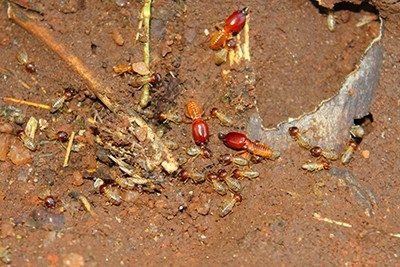FOR IMMEDIATE RELEASE
ACS News Service Weekly PressPac: February 17, 2021
Termite gut microbes could aid biofuel production
“Termite Gut Microbiota Contribution to Wheat Straw Delignificaton in Anaerobic Bioreactors”
ACS Sustainable Chemistry & Engineering
Wheat straw, the dried stalks left over from grain production, is a potential source of biofuels and commodity chemicals. But before straw can be converted to useful products by biorefineries, the polymers that make it up must be broken down into their building blocks. Now, researchers reporting in ACS Sustainable Chemistry & Engineering have found that microbes from the guts of certain termite species can help break down lignin, a particularly tough polymer in straw.
In straw and other dried plant material, the three main polymers –– cellulose, hemicelluloses and lignin –– are interwoven into a complex 3D structure. The first two polymers are polysaccharides, which can be broken down into sugars and then converted to fuel in bioreactors. Lignin, on the other hand, is an aromatic polymer that can be converted to useful industrial chemicals. Enzymes from fungi can degrade lignin, which is the toughest of the three polymers to break down, but scientists are searching for bacterial enzymes that are easier to produce. In previous research, Guillermina Hernandez-Raquet and colleagues had shown that gut microbes from four termite species could degrade lignin in anaerobic bioreactors. Now, in a collaboration with Yuki Tobimatsu and Mirjam Kabel, they wanted to take a closer look at the process by which microbes from the wood-eating insects degrade lignin in wheat straw, and identify the modifications they make to this material.
The researchers added 500 guts from each of four higher termite species to separate anaerobic bioreactors and then added wheat straw as the sole carbon source. After 20 days, they compared the composition of the digested straw to that of untreated straw. All of the gut microbiomes degraded lignin (up to 37%), although they were more efficient at breaking down hemicelluloses (51%) and cellulose (41%). Lignin remaining in the straw had undergone chemical and structural changes, such as oxidation of some of its subunits. The researchers hypothesized that the efficient degradation of hemicelluloses by the microbes could have also increased the degradation of lignin that is cross-linked to the polysaccharides. In future work, the team wants to identify the microorganisms, enzymes and lignin degradation pathways responsible for these effects, which could find applications in lignocellulose biorefineries.
The authors acknowledge funding from the PHC Sakura program, the Japan Society for the Promotion of Science, the Research Institute for Sustainable Humanosphere, the European Union’s Horizon 2020 ZELCOR program, the French National Research Institute for Agriculture, Food and Environment, the Region Languedoc-Roussillon Midi-Pyrénées grant and the Carnot Institute 3BCAR project.
###
The American Chemical Society (ACS) is a nonprofit organization chartered by the U.S. Congress. ACS’ mission is to advance the broader chemistry enterprise and its practitioners for the benefit of Earth and all its people. The Society is a global leader in promoting excellence in science education and providing access to chemistry-related information and research through its multiple research solutions, peer-reviewed journals, scientific conferences, eBooks and weekly news periodical Chemical & Engineering News. ACS journals are among the most cited, most trusted and most read within the scientific literature; however, ACS itself does not conduct chemical research. As a leader in scientific information solutions, its CAS division partners with global innovators to accelerate breakthroughs by curating, connecting and analyzing the world’s scientific knowledge. ACS’ main offices are in Washington, D.C., and Columbus, Ohio.
To automatically receive press releases from the American Chemical Society, contact newsroom@acs.org.
Note: ACS does not conduct research, but publishes and publicizes peer-reviewed scientific studies.
Media Contact
ACS Newsroom
newsroom@acs.org


